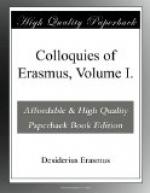Le. A fine Maid Servant, indeed!
Sb. Well, we’ll season our Eggs with pleasant Stories. I found a Place in the Epodes of Horace, not corrupted as to the Writing, but wrong interpreted, and not only by Mancinellus, and other later Writers; but by Porphyry himself. The Place is in the Poem, where he sings a Recantation to the Witch Canidia.
tuusque venter
pactumeius, et tuo
cruore rubros
obstetrix pannos lavit,
utcunque fortis
exilis puerpera.
For they all take exilis to be a Noun in this Place, when it is a Verb. I’ll write down Porphyry’s Words, if we can believe ’em to be his: She is exilis, says he, under that Form, as though she were become deform’d by Travel; by Slenderness of Body, he means a natural Leanness. A shameful Mistake, if so great a Man did not perceive that the Law of the Metre did contradict this Sense. Nor does the fourth Place admit of a Spondee: but the Poet makes a Jest of it; that she did indeed bear a Child, though she was not long weak, nor kept her Bed long after her Delivery; but presently jumpt out of Bed, as some lusty lying-in Women used to do.
Hi. We thank you Sbrulius, for giving us such fine Sauce to our Eggs.
Le. There is another Thing in the first Book of Odes that is not much unlike this. The Ode begins thus: Tu ne quae sieris. Now the common Reading is thus, Neu Babylonios Tentaris numeros, ut melius quicquid erit pati. The antient Interpreters pass this Place over, as if there were no Difficulty in it. Only Mancinettus thinking the Sentence imperfect, bids us add possis.
Sb. Have you any Thing more that is certain about this Matter?
Le. I don’t know whether I have or no; but in my Opinion, Horace seems here to have made Use of the Greek Idiom; and this he does more than any other of the Poets. For it is a very common Thing with the Greeks, to join an infinitive Mood with the Word [Greek: hos] and [Greek: hoste]. And so Horace uses ut pati, for ut patiaris: Although what Mancinellus guesses, is not altogether absurd.
Hi. I like what you say very well. Run, Mouse, and bring what is to come, if there be any Thing.
Cr. What new dainty Dish is this?
Hi. This is a Cucumber sliced; this is the Broth of the Pulp of a Gourd boil’d, it is good to make the Belly loose.
Sb. Truly a medical feast.
Hi. Take it in good Part. There’s a Fowl to come out of our Hen-Coop.
Sb. We will change thy Name, and call thee Apicius, instead of Hilary.
Hi. Well, laugh now as much as you will, it may be you’ll highly commend this Supper to Morrow.
Sb. Why so?




